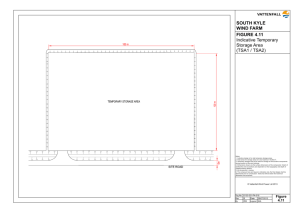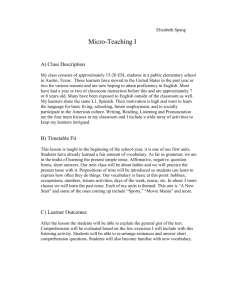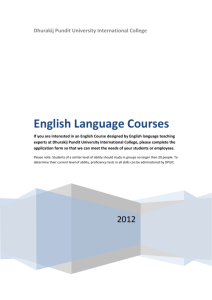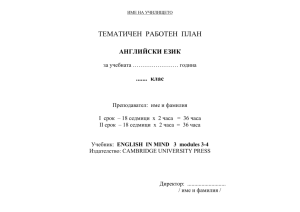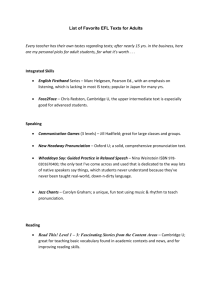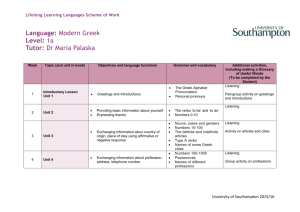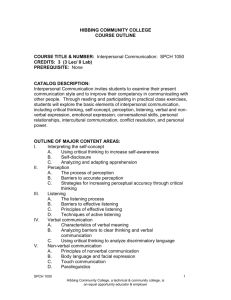LAN419
advertisement
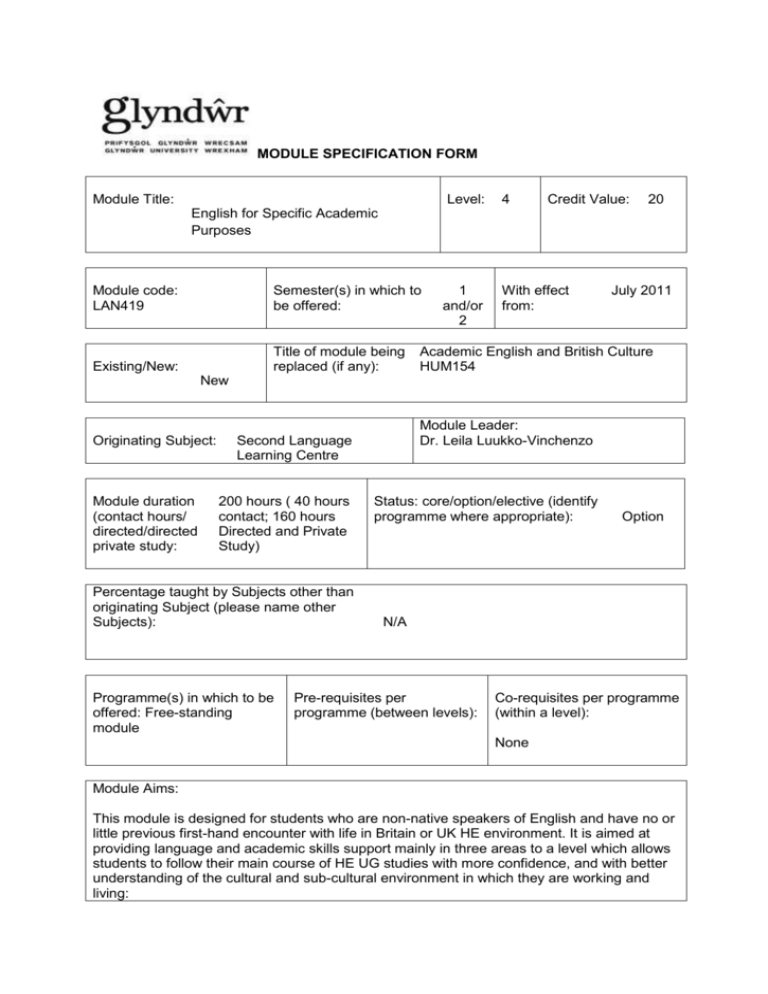
MODULE SPECIFICATION FORM Module Title: Level: 4 Credit Value: 20 English for Specific Academic Purposes Module code: LAN419 Semester(s) in which to be offered: Existing/New: Title of module being replaced (if any): 1 and/or 2 With effect from: July 2011 Academic English and British Culture HUM154 New Originating Subject: Module duration (contact hours/ directed/directed private study: Module Leader: Dr. Leila Luukko-Vinchenzo Second Language Learning Centre 200 hours ( 40 hours contact; 160 hours Directed and Private Study) Percentage taught by Subjects other than originating Subject (please name other Subjects): Programme(s) in which to be offered: Free-standing module Status: core/option/elective (identify programme where appropriate): Option N/A Pre-requisites per programme (between levels): Co-requisites per programme (within a level): None Module Aims: This module is designed for students who are non-native speakers of English and have no or little previous first-hand encounter with life in Britain or UK HE environment. It is aimed at providing language and academic skills support mainly in three areas to a level which allows students to follow their main course of HE UG studies with more confidence, and with better understanding of the cultural and sub-cultural environment in which they are working and living: a) English language skills in general and in all four areas (reading, writing, speaking and listening) with view on the students’ main subject area; b) Academic English and study skills in all four areas with focus on the students’ subject field; c) English language skills in the students’ specific academic field of study (ESP). On completion of the module the students will have achieved an overview of British culture and current affairs, of UK HE system and life, improved their general English language skills by a degree comparable to appr. 0.5 IELTS, and gained academic and language related subject-specific skills required to better succeed in their main field of studies Expected Learning Outcomes At the end of this module, students should be able to: Knowledge and Understanding: 1. Display deepened and widened knowledge of the sounds, syntax, morphology and lexicon of general and everyday English in context 2. Show knowledge and experience of UK HE system and academic environment, with particular reference to their subject related areas; British current affairs and culture, especially in the context of their subject area 3. Demonstrate a sound basis of academic skills in English in the four main areas of listening, speaking, reading and writing – with an emphasis on researching and analysing for, constructing and delivering assignments in their subject area 4. Reveal expanded knowledge of and skills in mainly structures and lexical choice of English specific to the students’ field of study . Transferable/Key Skills and other attributes: Students will develop skills in the following: Communication in general English, applied and extended to communication in both academic and specific cultural and professional contexts Listening and reading for general and specific purposes; information gathering and processing Speaking and writing using the appropriate style/genre/format by considering factors such as the composition of audience, purpose of delivery, methods of delivery, time management etc. Confidence, independence, working with and relating to others Understanding and appreciating intercultural communication and adapting to new environments Analytical thinking using English as a language for research and participation in oral and written discussion, in general and subject specific academic contexts Reflection on own learning and development Assessment: please indicate the type(s) of assessment (eg examination, oral, coursework, project) and the weighting of each (%). Details of indicative assessment tasks must be included. The indicative assessment comprises the tasks as listed below with one integrated mark being submitted for assessment. Weightings identified are for indicative purposes only. oral skills: a short oral, subject specific presentation and free discussion – 10 mins in total (20%) writing skills: a subject specific report or essay; (equivalent to 1,000 words) (30%) reading skills: read and understand a subject specific text, answer questions in English (15%) listening skills: listen to subject specific audio material, answer questions in English (15%) completion of timed subject specific language exercises (20%) Assessmen t One Learning Outcomes to be met 1, 2, 3, 4 Type of assessment Weightin g Duration (if exam) Classroom based tests, and coursework (report/essay) 100% No more than 2 hours for tests Word count or equivalent if appropriate Learning and Teaching Strategies: The module will be delivered mainly through tutor-led formal classes, with scheduled opportunities for the intensive study of subject specific language and practice of intercultural communication skills also outside the classroom. Pair and small-group work will be emphasised in order to foster team work in a multilingual setting by using English as the common medium of communication. Extensive additional learning resources, including audio and visual materials and other appropriate materials will be available for private study. Students will follow a course book, accompanied by additional material provided by Glyndŵr staff, and a range of resources with backup material on Moodle. Students will complete regular written exercises to consolidate learning. Syllabus outline: 1. Life and current affairs in Great Britain; Higher Education in the UK, with particular reference to the study culture in the subject specific area; 2. General Language vs. Languages for Specific Purposes; Selected lexical (e.g. collocations, verbs with prepositions, idioms, subject specific vocabulary), syntactical (e.g. word order, sentence types) and morphological (e.g. prefixes and suffixes) aspects as appropriate to the subject specific language and the level of the module 3. Subject specific grammatical features, e.g. verbs with prepositions, tenses, passive mode, modal verbs, noun phrases, adverbs and adverbial clauses, punctuation etc., as appropriate to the subject specific language and the level of the module 4. Academic reading: e.g. strategies (scanning, skimming), critical and analytical thinking, summarizing subject specific texts, as appropriate to the level of the module 5. Academic writing: e.g. structure, paragraphs, cohesion, fact vs. opinion, graphs/tables, plagiarism, referencing, quoting, paraphrasing, proofreading, writing a subject specific assignment – as appropriate to the level of the module 6. Academic listening: e.g. clues, key points, new vocabulary, note-taking in subject specific lectures/ presentations/seminars, as appropriate to the level of the module 7. Academic oral communication: e.g. pronunciation, stress, intonation, varieties of spoken English, description vs. persuasion, presentation of a subject specific topic, as appropriate to the level of the module. 8. Acquisition of cultural awareness within the EAP/ESP programme, as appropriate to the level of the module Bibliography Essential resources: McCarthy, M./O’Dell, F. (2008) Academic Vocabulary in Use. CUP Other indicative resources: Hewings, M. 92005) Advanced Grammar in Use with Answers. 2nd ed. CUP Appropriate additional materials will be pre-prepared and made available to students by Glyndŵr staff, including handouts, reading and other materials as appropriate for the subject specific language and the level of the module. Students will also have access to an appropriate range of supplementary material and links to web-based resources on Moodle, including linguistic exercises, comprehension exercises and other stimulus material in order to facilitate independent learning.
